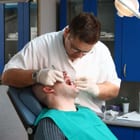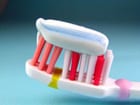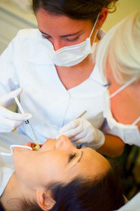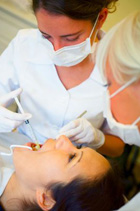 In the main there are two different types of dentistry: preventive and curative. The first of these two types is far more preferable because it means that problems are stopped before they have even started. If you think about the choice, it is not really a hard one: prevent an oral condition occurring or undergo treatment once it has happened. I’m sure most people would prefer not to have to undergo treatment.
In the main there are two different types of dentistry: preventive and curative. The first of these two types is far more preferable because it means that problems are stopped before they have even started. If you think about the choice, it is not really a hard one: prevent an oral condition occurring or undergo treatment once it has happened. I’m sure most people would prefer not to have to undergo treatment.
This is as true for gum disease as it is with other ailments which might affect the mouth. The sad thing about gum disease is that it is very common in the United Kingdom but it is really rather easy to avoid. Gum disease can occur when plaque is left on the gum line of teeth and causes the gums to become inflamed. If you adequately remove the plaque from your teeth then diseased gums shouldn’t be a problem. It is a matter of brushing all of your mouth with care and attention and flossing as well so that plaque cannot stick around between your teeth.
The good news is that gum disease is pretty easy to deal with, especially in its early stage of gingivitis. Brush better and floss, as already suggested, but certain formulated mouth washes can be used too and sometimes a simple course of antibiotics are all that is needed.
Going to see your City of Leeds dentist is crucial in the process of preventive dentistry. They can examine your mouth and observe how well your teeth and gums are doing. They might just notice a subtle change in the way your teeth and gums look and then can advise you how to change your habits to stop gum disease before it gets more serious.





 Everybody wants to know the secrets to looking good because, for better or worse, image is important in the modern world. Hair, clothes and skin play a major part but one thing that people often overlook is how their teeth look. This can have implications for the health of the teeth as well. When you meet a new person or address a meeting of your colleagues, eyes will be drawn to your mouth as you smile and talk so it very important that your teeth look the part, like the rest of you.
Everybody wants to know the secrets to looking good because, for better or worse, image is important in the modern world. Hair, clothes and skin play a major part but one thing that people often overlook is how their teeth look. This can have implications for the health of the teeth as well. When you meet a new person or address a meeting of your colleagues, eyes will be drawn to your mouth as you smile and talk so it very important that your teeth look the part, like the rest of you. Taking care of your teeth might seem like a daunting business, especially if you have suffered from poor oral hygiene in the past. But don’t be intimidated by it; following a simple set of instructions so that they become habits will help you with maintaining excellent oral hygiene for the rest of your life. Read on to find out more!
Taking care of your teeth might seem like a daunting business, especially if you have suffered from poor oral hygiene in the past. But don’t be intimidated by it; following a simple set of instructions so that they become habits will help you with maintaining excellent oral hygiene for the rest of your life. Read on to find out more! Going to the dentist for a visit every six months or so goes a long way to helping with keeping your teeth and gums healthy. Your mouth is a highly specialised collection of parts which work together to make your life easier. If any one part of it becomes diseased or loses functionality then it can threaten the smooth working of the whole thing. Your dentist is best placed to examine the whole of your mouth so that it stays healthy for you.
Going to the dentist for a visit every six months or so goes a long way to helping with keeping your teeth and gums healthy. Your mouth is a highly specialised collection of parts which work together to make your life easier. If any one part of it becomes diseased or loses functionality then it can threaten the smooth working of the whole thing. Your dentist is best placed to examine the whole of your mouth so that it stays healthy for you. You should always make time in your daily routine to take care of your teeth. First thing in the morning and last thing at night are the best times. When you sleep your mouth doesn’t produce much saliva so plaque and bacteria can thrive there. Most people brush their teeth as a matter of course but too many people don’t get around to flossing as well. If you are one of those people then you should consider how you might be endangering the good health of your teeth.
You should always make time in your daily routine to take care of your teeth. First thing in the morning and last thing at night are the best times. When you sleep your mouth doesn’t produce much saliva so plaque and bacteria can thrive there. Most people brush their teeth as a matter of course but too many people don’t get around to flossing as well. If you are one of those people then you should consider how you might be endangering the good health of your teeth. Your gums should be just as important in your mind when you are thinking about taking care of your mouth. They are a greater cause of tooth loss than dental decay itself so it is well worth paying attention to how well you are looking after them. Rather than having to go through the pain and indignity of suffering from gum disease and then having to have it treated, it is best to look after them in the first place to do your best in making sure that gum disease doesn’t occur.
Your gums should be just as important in your mind when you are thinking about taking care of your mouth. They are a greater cause of tooth loss than dental decay itself so it is well worth paying attention to how well you are looking after them. Rather than having to go through the pain and indignity of suffering from gum disease and then having to have it treated, it is best to look after them in the first place to do your best in making sure that gum disease doesn’t occur. We all know how important it is to keep our teeth clean and healthy so that eating, drinking and talking can be undertaken with ease. Brushing and flossing stops plaque building up so that teeth stay free from plaque which can cause them to decay and lead to gum disease. But dental health has implications for the rest of your body too and ought to be seen in those terms. By looking after your teeth you are also looking after your general health.
We all know how important it is to keep our teeth clean and healthy so that eating, drinking and talking can be undertaken with ease. Brushing and flossing stops plaque building up so that teeth stay free from plaque which can cause them to decay and lead to gum disease. But dental health has implications for the rest of your body too and ought to be seen in those terms. By looking after your teeth you are also looking after your general health. We all know how important it is to brush our teeth but how many of us neglect to floss? The fact is that flossing is a vital part of keeping your mouth nice and healthy and ought to form part of your routine. Not doing so is just helping plaque to keep a hold in your mouth and put you at risk of dental decay and other oral conditions.
We all know how important it is to brush our teeth but how many of us neglect to floss? The fact is that flossing is a vital part of keeping your mouth nice and healthy and ought to form part of your routine. Not doing so is just helping plaque to keep a hold in your mouth and put you at risk of dental decay and other oral conditions. Your smile will be one of the first things that someone sees when you are being introduced to them and as such it forms part of the initial impression you will make on them. But having healthy teeth is not just about your looks. It is also vital in ensuring that your mouth is effective and functions as it ought to. Your dentist will be able to advise you on the best ways to keep your teeth healthy.
Your smile will be one of the first things that someone sees when you are being introduced to them and as such it forms part of the initial impression you will make on them. But having healthy teeth is not just about your looks. It is also vital in ensuring that your mouth is effective and functions as it ought to. Your dentist will be able to advise you on the best ways to keep your teeth healthy. Taking good care of your teeth helps you to eat, drink and talk in comfort. These are activities which you can easily take for granted but if you find that you suddenly suffer from tooth or gum disease then you might not be able to carry them out as easily as you are used to. This is why it is vital that you take excellent care of your teeth in the manner that dentists recommend.
Taking good care of your teeth helps you to eat, drink and talk in comfort. These are activities which you can easily take for granted but if you find that you suddenly suffer from tooth or gum disease then you might not be able to carry them out as easily as you are used to. This is why it is vital that you take excellent care of your teeth in the manner that dentists recommend.

